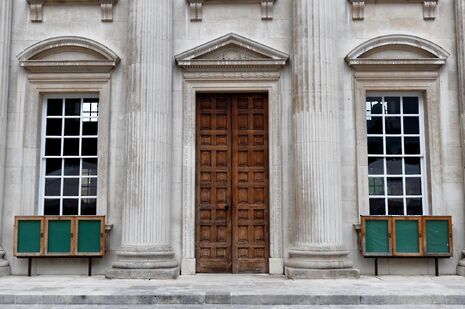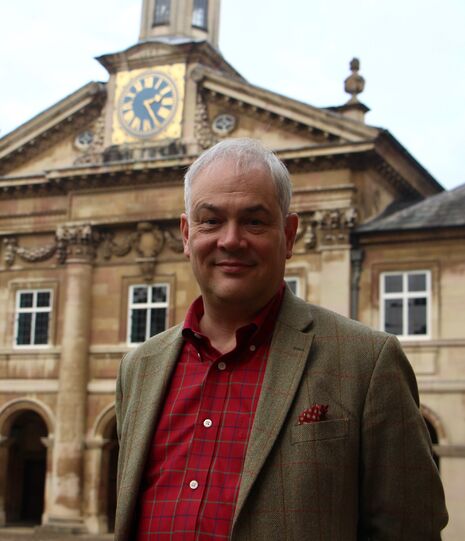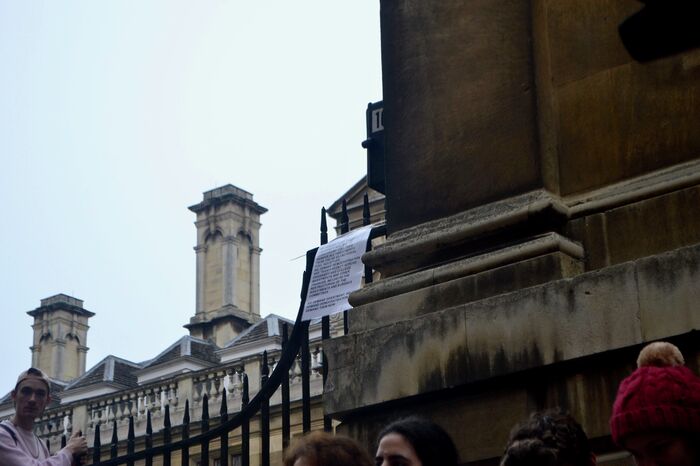Transparency of Cambridge investments sees sharp rebuke in heated Senate House discussion
The Investment Office has been at the centre of the fight over divestment: its use of external, third-party fund managers has left many campaigners calling for greater accountability

In December, a fifth of the University’s executive decision-making body, University Council, made a landmark dissent from an annual report – the first time in at least ten years.
The dissenters wrote that they “cannot properly discharge our duty as trustees of the University if we are arbitrarily and persistently denied the access to such documents, in particular, to those of the Investment Board.”
On Tuesday, during a discussion in Senate House of the annual report, speakers sharply criticised a perceived lack of transparency of Cambridge’s Investment Office.
Speaking to those gathered in Senate House, Reverend Jeremy Caddick, the Dean and Chaplain of Emmanuel College, speculated: “The University administration is terrified of the people who have been running the Investment Office and have done little to challenge them or to hold them to account.”
Two of the dissenters, Professor Ross Anderson and Professor Nick Gay, spoke.
Professor Anderson commented on the denial of access to the Investment Office’s papers for all Council members: “We seem somehow to have traded the rule of law for rule by lawyers,” in reference to the University’s constitution, called its Statutes and Ordinances, which include in Council’s standing orders that a motion for members to have access to relevant papers can be proposed during a meeting and approved by two-third of the members present.
He argued: “At any time in the past fourteen months, the Vice-Chancellor could have dealt with the matter.
“He did not do so, despite having a good working majority on Council. I find this contempt for our rules deeply unsettling.”
Cambridge’s Investment Office oversees Cambridge’s main endowment fund, which holds assets worth £3.19bn – over the past year, it has faced considerable scrutiny by academics and campaigners for a perceived lack of transparency in its operations. Its investment policy, overseen by the University Council and advised by the Investment Board, follows the main objective of “maximis[ing] the total return from the University’s investments within an acceptable risk exposure”, working mainly through external third-party fund managers.
In September, nearly half of Cambridge’s Investment Office resigned. The Financial Times reported two people familiar with chief investment officer Nick Cavalla’s resignation said he believed the debate around divestment has left staff unable to get on with their “jobs of trying to maximise the value of their endowment”.
Another discussion is set to take place in Senate House on Tuesday on the future of the Investment Office.

Reverend Caddick also commented on the fact that five out of 25 members of Council dissented on the report: “The question here, members of the Council, is what the rest of you have been doing. Can you seriously say, hand on heart, that you have been discharging your responsibilities when you have no idea what is going on?”
He said in the discussion: “Can the Council now reassure the Regent House that in repopulating the Investment Office they will find the moral courage to stand up to the money people and put in place mechanisms for greater openness and accountability?”
Cambridge’s divestment working group, set up in May 2017 to consider the pros and cons of divestment, recommended greater transparency of the Investment Office. In response, the University said that the Investment Office would be asked to report to the Council annually, and that Council members could request to be invited annually to a seminar on the work of the Investment Office.
They also said that they had instructed the Investment Office “to enhance significantly its public reporting, including on the University’s website, so as to make information much more readily accessible.”
Reverend Caddick, who has been an outspoken supporter of Cambridge’s divestment movement, criticised Council’s action on divestment.
In June, Council decided that Cambridge would not be divesting fully from fossil fuels, in what was seen as a landmark rejection of full divestment after three years of campaigning from pro-divestment supporters.
The decision was largely based on the recommendations of the divestment working group. The group released its highly-anticipated final report in May last year, recommending a position they called ‘considered divestment’.
During the Senate House discussion, Reverend Caddick urged Council to publicly retract the term ‘considered divestment’, and said: “you are fooling no-one with this term ‘considered divestment’ … Such disingenuous green-washing, members of the Council, only serves to harm the moral authority of our University, and to harm your standing within it.”
He said the term ‘considered divestment’ “is a monstrosity of duplicity and bad faith,” and explained: “‘considered divestment’ is neither considered nor divestment.
“It is not ‘considered’ [because] the Council are not able to consider the working of the Investment Office even if they should show an inclination to … Neither is it ‘divestment’ because nothing has changed.”
- Updated, 4th February: This article was edited to clarify that Cambridge’s main endowment fund holds assets worth £3.19bn
 News / Judge Business School advisor resigns over Epstein and Andrew links18 February 2026
News / Judge Business School advisor resigns over Epstein and Andrew links18 February 2026 News / Hundreds of Cambridge academics demand vote on fate of vet course20 February 2026
News / Hundreds of Cambridge academics demand vote on fate of vet course20 February 2026 News / Gov grants £36m to Cambridge supercomputer17 February 2026
News / Gov grants £36m to Cambridge supercomputer17 February 2026 News / CUCA members attend Reform rally in London20 February 2026
News / CUCA members attend Reform rally in London20 February 2026 News / Union speakers condemn ‘hateful’ Katie Hopkins speech14 February 2026
News / Union speakers condemn ‘hateful’ Katie Hopkins speech14 February 2026











